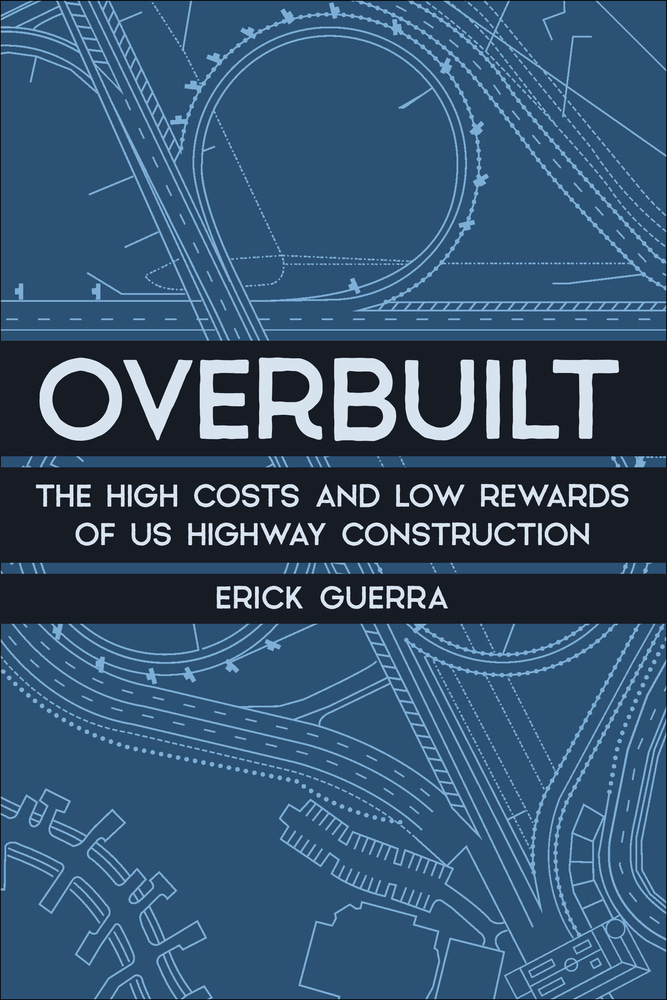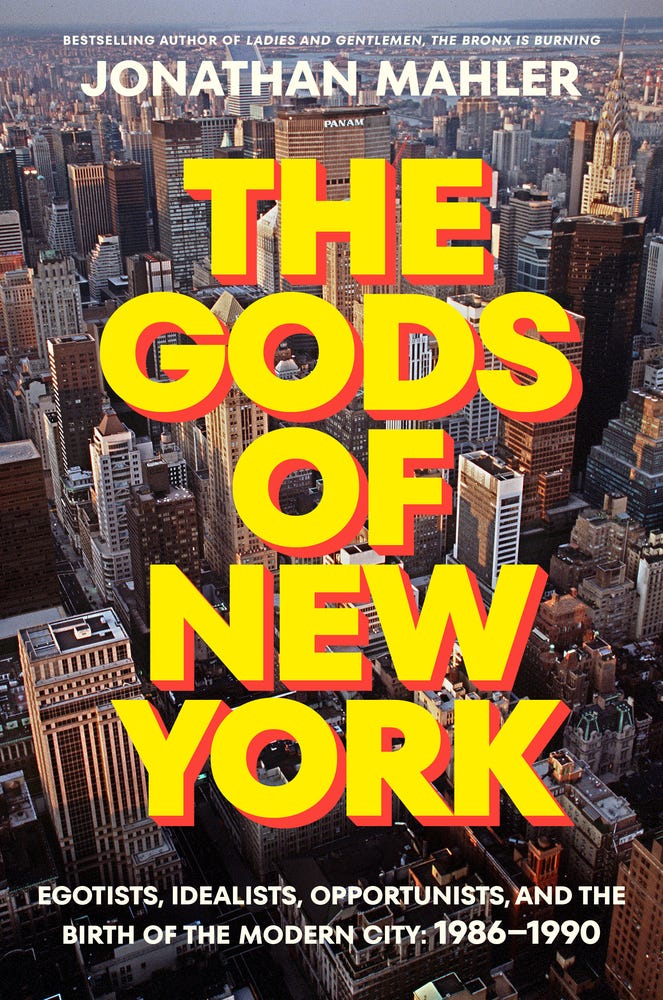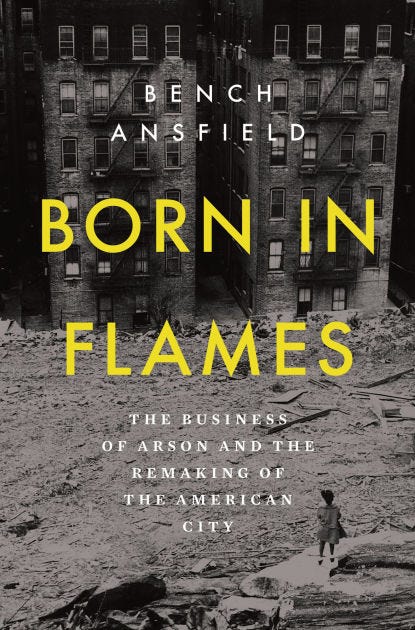3 Books to Read This Summer, Plus the Next Book Club Pick
Plus: Register for a subscriber-only event in Philly
Each season I round up the most interesting urbanism-related books. In summer, publishers release their beach reads — not books that put you in the mind of steamy, concrete jungles. But we’ve got three great options here, plus the next book in our book club series and the September Philly subscriber event details (behind the paywall because I’ve got to prioritize my paid subscribers)! The summer 2025 books and past highlighted books from previous seasons are available for purchase on my Bookshop page.
Overbuilt: The High Costs and Low Rewards of US Highway Construction
By Erick Guerra
July 05
Just a few weeks ago, I testified in front of Philadelphia’s City Council about removing parking minimums with transportation expert and Penn professor, Erick Guerra.
That made me even more excited for Overbuilt, in which Guerra details the extensive damage wreaked by the creation of the highway system and the ills of car dependency.
Guerra’s book describes how the U.S. roadway system became overbuilt, how public policy continues to encourage overbuilding, what the scale and consequences of overbuilding are, and how we can rethink our approach to highway building in the U.S.
Guerra explains that overbuilding stems from the institutions, finance mechanisms, and evaluation metrics developed in the first half of the twentieth century. While more funds are set aside for transit, walking, biking, and beautification, the investment paradigm has not changed. Planners and engineers have not adjusted the tools they use to determine which roads should be built, rebuilt, or widened and why. And so despite trillions of dollars spent to reduce congestion and improve traffic safety, congestion and traffic accidents remain endemic.
The Gods of New York: Egotists, Idealists, Opportunists, and the Birth of the Modern City: 1986-1990
By Jonathan Mahler
August 12
As a child of 1980s New York City, this book jumped out at me. It covers how New York radically changed between 1986 and 1989 through some major events and characters.
Howard Beach. Black Monday. Tawana Brawley. The crack epidemic. The birth of ACT UP. The Central Park jogger. The release of Do the Right Thing. And a cast of outsized characters—Ed Koch, Donald Trump, Al Sharpton, Spike Lee, Rudy Giuliani, Larry Kramer—would compete to shape the city’s future while building their own mythologies.
The Gods of New York explores a city whose identity was suddenly up for grabs: Could it be both the great working-class city that lifted up immigrants from around the world and the money-soaked capital of global finance? Could it retain a civic culture—a common idea of what it meant to be a New Yorker—when the rich were building a city of their own and vast swaths of its citizens were losing faith in the systems meant to protect them? New York City was one thing at the dawn of 1986; it would be something very different as 1989 came to a close.
Born in Flames The Business of Arson and the Remaking of the American City
by Bench Ansfield
August 19
“Ladies and gentlemen, the Bronx is burning!” Supposedly uttered by announcers during the 1977 World Series as flames rose above Yankee Stadium, the phrase encapsulated an entire chaotic era in this nation’s history. Across the 1970s, a wave of arson coursed through American cities, leveling poor communities of color. However, as historian Bench Ansfield demonstrates in Born in Flames, the majority of those fires weren’t set by residents—as is usually assumed—but by landlords seeking insurance payouts. Ansfield introduces the term “brownlining” for the subprime insurance practices imposed by the federal government and insurance industry after 1968, and shows why, with buildings worth more dead than alive, landlords turned to the torch. In an expansive narrative stretching from the Bronx to Britain to Brazil, Ansfield tracks the flows of money that signaled the arrival of our financialized age.
And finally, I’m excited to announce a very timely book for the next book club:
Shade: The Promise of a Forgotten Natural Resource
by Sam Bloch
The book comes out July 22 and our book club will be meeting on August 14 at 6pm ET via Zoom to have a discussion with the author, Sam Bloch.
Click here to register for the Book Club conversation with the author.
I know that Shade is going to be a much-discussed book this summer. With record-high temperatures in June, how can we do a better job of keeping people and places cool throughout the warm months? I’ve written about how we need to create a shademaking movement and really believe this is such a critical topic for the future of our cities as urban heat island effect makes dense places that much warmer in the summer.
Here’s more about Shade from its publisher:
Shade was once a staple of human civilization…
So what happened in the U.S.? The arrival of air conditioning and the dominance of cars took away the impetus to enshrine shade into our rapidly growing cities. Though a few heroic planners, engineers, and architects developed shady designs for efficiency and comfort, the removal of shade trees in favor of wider roads and underinvestment in public spaces created a society where citizens retreat to their own cooled spaces, if they can—increasingly taxing the energy grid—or face dangerous heat outdoors.
Shade examines the key role that shade plays not only in protecting human health and enhancing urban life, but also looks toward the ways that innovative architects, city leaders, and climate entrepreneurs are looking to revive it to protect vulnerable people—and maybe even save the planet.
Next steps:
Pre-order the book so that you have it ready to pick up from your local bookstore or arriving at your home on July 22nd.
Read the book and come ready to ask one question at book club. Like last time, I’ll start the discussion (this time joined by my co-conspirator Kerry Hayes who helped nudge me to launch the book club) and then we’ll open the discussion up to you all to ask your questions.
Put the event in your calendar for August 14 at 6pm ET. I’ll send a reminder a week in advance but it’s best if you put the date down now.
Register to join us! I will be capping RSVPs at 40 people, guessing that about 25 of those folks will show. This gives us a good number of people for Q&A.








